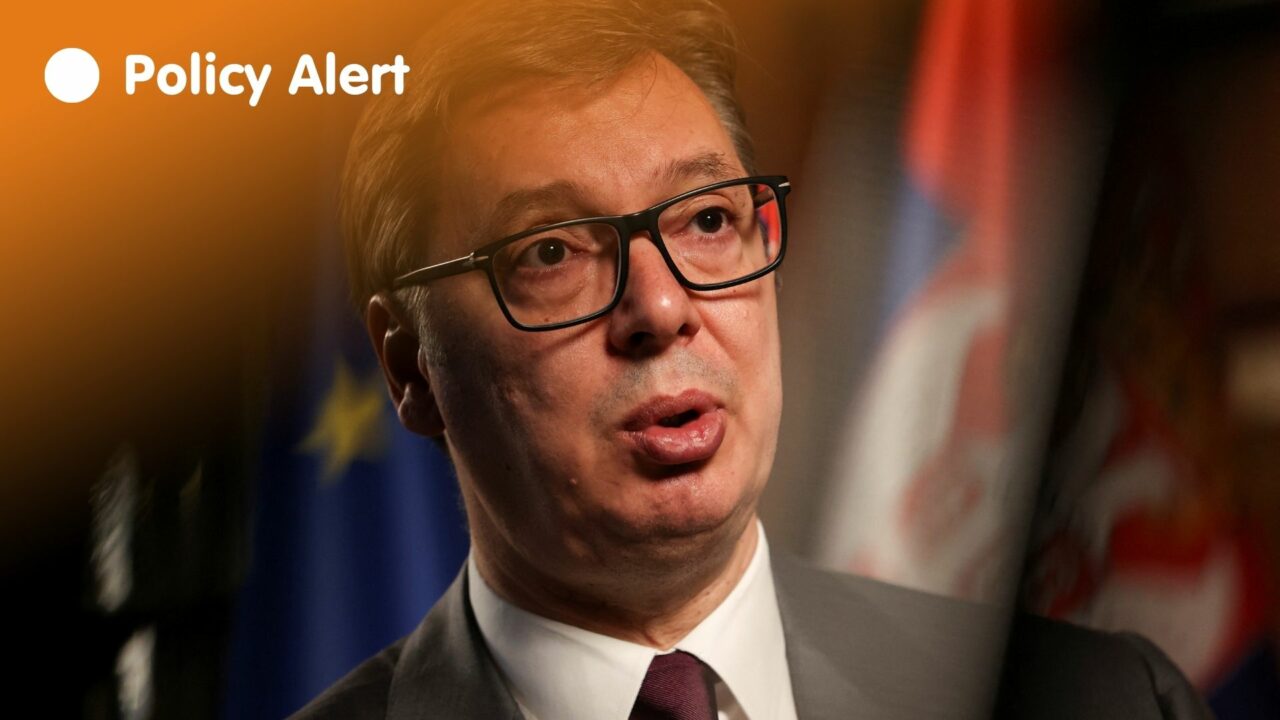Caught red handed: Why the EU and the US should not keep faith in Vucic
After armed groups violently attacked Kosovo police on 24 September, reports surfaced of a Serbian military buildup along the border with Kosovo. The Serbian army has since withdrawn nearly half of its troops from the area, following calls for immediate de-escalation from the US National Security Council (NSC) and White House warnings of a “very destabilising” and “unprecedented” situation.
This language is a stark escalation from a statement issued last week by the US state department which barely mentioned Serbia when condemning the attacks. And the European Union, while concurring with the US, is yet to come out with a concrete stance on Serbia’s posture in the region.
In Europe’s current security climate – particularly Russia’s war on Ukraine – a destabilised Balkans is the last thing European policymakers need. A mishandling of the Kosovo-Serbia dispute by the EU and the US not only risks undermining European strategic unity but could have grave consequences for regional and European security.
Steps towards stabilisation
For a lasting regional peace and stability, first the security situation on the border and in the north of Kosovo must be settled:
- Firstly, if the Serbian army has not entirely withdrawn from the border area within a week, NATO should consider dismissing Serbian membership in the partnership for peace program and close down its military representative mission to NATO, on the grounds that Serbia is not a good-faith partner.
- If Vucic insists on maintaining control over the territory in the north of Kosovo and its Serbian community, the EU must consider freezing financing and subsequently cancelling Serbia’s accession talks, as this is a direct breach of peace, security, and good neighbourly relations.
- The EU and the US must soberly reevaluate their relations with Serbia, which has failed to distance itself from Russia since the invasion of Ukraine.
- In addition to the announced reinforcement of its peacekeeping force in Kosovo (KFOR), NATO should implement a support plan for Kosovo’s security institutions to provide safe environments for citizens in the north of Kosovo, irrespective of their ethnic background.
- Once the security situation in the north of Kosovo is stable, efforts to support Serbs returning to Kosovo institutions should follow. The return of Kosovo-Serb personnel to the Kosovo police and judiciary will build confidence in Serb reintegration and partaking in the persecution of the recent attack’s perpetrators.
Despite being cloaked in the language of minority protection, the dispute is a territorial one. It is born of Vucic’s aims to strengthen Serbia’s control of Kosovo’s north, while Kosovo’s prime minister Albin Kurti is adamant to extend territorial sovereignty throughout Kosovo and restore rule of law in the north. Indeed, the latest attacks on the Kosovo police, and the military buildup, could well be part of Serbia’s larger strategy to eventually annex the north, de facto at least.
Under these circumstances, for the Kosovo-Serbia dialogue process to lead to a normalisation of relations and a final agreement centred on mutual recognition, a groundwork of good-faith and acceptance of Kosovo’s statehood will need to be in place first. For the EU to play a key role in realising this, it should cease acting as a status-neutral actor, despite the stance of non-recogniser states towards Kosovo. In doing so, the EU could create the circumstances for Kosovo and Serbia to re-engage in implementing the EU normalisation proposal in its entirety.
The European Council on Foreign Relations does not take collective positions. ECFR publications only represent the views of their individual authors.



